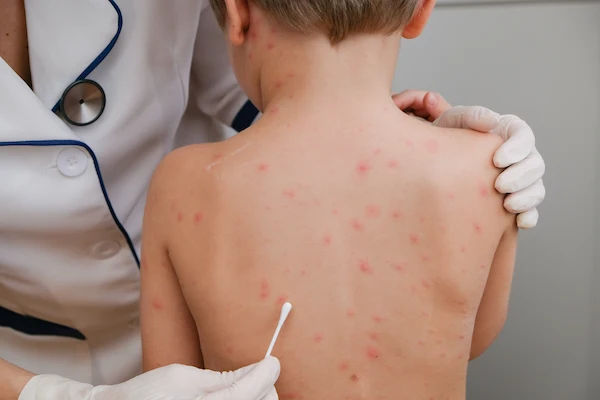Chickenpox Signs and Prevention: A Complete Guide
Discover the key signs of chickenpox and effective prevention methods in this complete guide to protect yourself and your loved ones.


Introduction
Chickenpox, once a universal childhood rite of passage, is now a highly preventable disease. Caused by the varicella-zoster virus, it's famously known for its itchy, blister-like rash that covers the body. While often mild in children, it can lead to severe complications in infants, adults, and those with weakened immune systems. Understanding the signs of chickenpox is crucial for early isolation and care, but the real power lies in effective prevention. This guide will walk you through everything you need to know, from identifying the first symptoms to the best strategies for protection, including the vital role of the chickenpox vaccine. Whether you're a concerned parent or just looking to safeguard your health, knowledge is your first line of defense.
What Exactly is Chickenpox?
Chickenpox is an infectious disease caused by the varicella-zoster virus (VZV). It spreads with remarkable ease through the air when an infected person coughs or sneezes, or through direct contact with the fluid from the characteristic blisters. Before the vaccine became widely available in the mid-1990s, nearly everyone contracted chickenpox by adulthood. Today, thanks to robust chickenpox preventions, cases have dramatically declined.
The Varicella-Zoster Virus (VZV): The Root Cause
This virus is the sole culprit behind chickenpox. After a person recovers from chickenpox, the virus doesn't leave the body; instead, it lies dormant in nerve tissue. Years or even decades later, VZV can reactivate and cause a painful condition called shingles (herpes zoster). This intrinsic link is why preventing the initial chickenpox infection is so important for long-term health.
Consult a General Physician for the best advice
Recognizing the Signs and Symptoms of Chickenpox
The illness typically lasts about 5 to 10 days. The symptoms don't all appear at once but rather in recognizable stages.
Stage 1: The Prodromal Phase (Before the Rash)
Before the infamous rash emerges, individuals often experience a prodromal (pre-illness) phase, which can last 1-2 days. Symptoms are flu-like and include:
- Fever
- Loss of appetite
- Headache
- Tiredness and a general feeling of being unwell (malaise)
These early signs of chickenpox are easily mistaken for a common cold, making the disease contagious before anyone knows it's present.
Stage 2: The Classic Chickenpox Rash
The telltale rash is the definitive sign. It goes through three phases and appears in waves, so you may see all three stages on the body at the same time.
The Rash Lifecycle: Papules, Vesicles, and Scabs
1. Raised pink or red bumps (papules) that break out over several days.
2. Small fluid-filled blisters (vesicles) that form from the bumps over about one day before they break and leak.
3. Crusts and scabs that cover the broken blisters and take several more days to heal.
The rash often starts on the chest, back, and face before spreading everywhere else, including the scalp, mouth, eyelids, and genitals.
How Long Are You Contagious?
A person with chickenpox is contagious from 1 to 2 days before the rash appears until all the blisters have crusted over. This period of high contagion is why isolation is a key part of preventing its spread.
Who is Most at Risk for Severe Chickenpox?
While anyone can get chickenpox, these groups are more likely to have serious complications:
- Newborns and infants whose mothers never had chickenpox or the vaccine.
- Adults and adolescents.
- Pregnant women who haven't had chickenpox (which can lead to birth defects).
- People with weakened immune systems (e.g., from chemotherapy, HIV, or steroid use).
- Smokers (who are more prone to pneumonia as a complication).
The Gold Standard of Prevention: The Chickenpox Vaccine
The most effective way to prevent chickenpox is through vaccination. The varicella vaccine has transformed public health and is a safe, proven tool.
How the Varicella Vaccine Works
The vaccine contains a live but weakened form of the virus. This stimulates your body's immune system to produce antibodies that will fight off the real virus if you are ever exposed to it in the future, without causing the full-blown disease.
Vaccine Schedule and Effectiveness
The CDC recommends a two-dose schedule:
- First dose: 12 through 15 months of age.
- Second dose: 4 through 6 years of age.
For older children and adults who never received the vaccine, two doses are given 4 to 8 weeks apart. The vaccine is about 90% effective at preventing the disease entirely. For the small percentage of vaccinated people who still get chickenpox, their symptoms are almost always much milder, with fewer blisters, little to no fever, and a faster recovery.
Debunking Common Chickenpox Vaccine Myths
Understanding the facts about the chickenpox vaccine can help you make informed and confident health decisions.
- Myth: "The vaccine isn't necessary because chickenpox is mild."
- Fact: While often mild, chickenpox can still lead to hospitalization, severe skin infections, pneumonia, encephalitis, and even death. Vaccination eliminates this risk.
- Myth: "The vaccine can give you chickenpox."
- Fact: A small percentage may get a very mild rash or a slight fever, but this is not the full disease and is not contagious to others.
Other Crucial Prevention Strategies
Beyond vaccination, other measures are vital, especially if you or a family member is exposed.
Avoiding Exposure and Isolation
If someone in your household is sick:
- Keep them isolated from others, especially high-risk individuals, until all blisters are scabbed.
- Practice frequent, thorough hand washing with soap and water.
- Disinfect surfaces, toys, and bedding.
- Ensure they cover their mouth and nose when coughing or sneezing.
The Role of Post-Exposure Prophylaxis
If an unvaccinated, high-risk person is exposed to chickenpox, they have options:
- Vaccination: Getting vaccinated within 3 to 5 days of exposure may prevent the disease or lessen its severity.
- Varicella-Zoster Immune Globulin (VarIZIG): This antibody treatment can be given to high-risk individuals within 10 days of exposure to provide temporary protection.
How to Care for Someone with Chickenpox
There is no cure for chickenpox; treatment focuses on relieving symptoms and preventing complications.
1. Soothing the Itch and Managing Discomfort
- Calamine lotion or colloidal oatmeal baths can provide relief from itching.
- Keep fingernails trimmed short to prevent skin damage from scratching.
- Use over-the-counter antihistamines like diphenhydramine (Benadryl) for itch relief (consult a doctor for children).
- Provide acetaminophen (Tylenol) for fever and pain. Crucially, avoid aspirin, as its use in children with chickenpox is linked to Reye's syndrome, a rare but serious condition.
2. Preventing Secondary Infections and Scarring
The biggest risk from scratching is introducing bacteria into the open sores, which can lead to serious skin infections and permanent scarring. Keeping the skin clean and minimizing scratching is paramount.
Potential Complications of Chickenpox
Despite its common perception, chickenpox can be serious. Complications include:
- Bacterial infections of the skin and soft tissues.
- Pneumonia.
- Inflammation of the brain (encephalitis).
- Dehydration.
- Sepsis (bloodstream infection).
- For pregnant women: birth defects, low birth weight, and neonatal chickenpox.
Conclusion: Empowerment Through Prevention
Chickenpox doesn't have to be an inevitable childhood illness. While recognizing the signs of chickenpox is important for managing the disease and preventing its spread, our greatest tool is proactive prevention. The development and widespread adoption of the chickenpox vaccine represent a monumental achievement in modern medicine, protecting individuals and communities through herd immunity. By understanding the virus, respecting its potential severity, and taking advantage of safe and effective vaccinations, we can shield our most vulnerable and consign the suffering caused by chickenpox to the history books. If you or your children have not been vaccinated, speak with your healthcare provider today; it's a simple step that offers a lifetime of protection.
Consult a General Physician for the best advice
Consult a General Physician for the best advice

Dr. Harshendra Jaiswal
General Physician/ Internal Medicine Specialist
12 Years • MBBS , MD (General medicine)
Kolkata
108 DHANA DHANVANTARI Clinic, Kolkata
(25+ Patients)

Dr Syed Mateen Pasha
General Physician
2 Years • MBBS
Bengaluru
PRESTIGE SHANTHINIKETAN - SOCIETY CLINIC, Bengaluru

Dr. Vivek D
General Physician
4 Years • MBBS
Bengaluru
PRESTIGE SHANTHINIKETAN - SOCIETY CLINIC, Bengaluru

Dr. Syed Ismail Ali
General Practitioner
7 Years • MBBS
Hyderabad
Apollo 24|7 Clinic, Hyderabad
Dr. Thandra Ramoji Babu
General Physician/ Internal Medicine Specialist
5 Years • MBBS, DNB(General Medicine)
Warangal
Sai Ram multi-specialty hospital, Warangal
Consult a General Physician for the best advice

Dr. Harshendra Jaiswal
General Physician/ Internal Medicine Specialist
12 Years • MBBS , MD (General medicine)
Kolkata
108 DHANA DHANVANTARI Clinic, Kolkata
(25+ Patients)

Dr Syed Mateen Pasha
General Physician
2 Years • MBBS
Bengaluru
PRESTIGE SHANTHINIKETAN - SOCIETY CLINIC, Bengaluru

Dr. Vivek D
General Physician
4 Years • MBBS
Bengaluru
PRESTIGE SHANTHINIKETAN - SOCIETY CLINIC, Bengaluru

Dr. Syed Ismail Ali
General Practitioner
7 Years • MBBS
Hyderabad
Apollo 24|7 Clinic, Hyderabad
Dr. Thandra Ramoji Babu
General Physician/ Internal Medicine Specialist
5 Years • MBBS, DNB(General Medicine)
Warangal
Sai Ram multi-specialty hospital, Warangal
